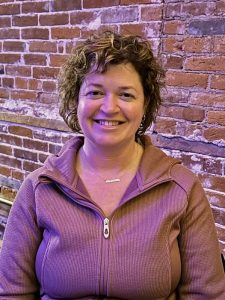Meyer’s ‘Chicago connection’ versus political reality
By Bill Dwyer For Chronicle Media — April 18, 2025
Jenny Gain Meyer
The idea of Chicago casting a long shadow over Downstate politics came up again in the race for Belleville mayor between challenger Jennie Gain Meyer and incumbent Patty Gregory.
A mailer sent to Belleville voters the week prior to the election alleged that “A network looking to return Belleville government to the old days of Chicago-style cronyism and machine politics is quietly and somewhat clumsily trying to take out our Mayor in the April 1 election.”
That old school Chicago network, the mailer alleged, “is made up of the old guard, the professional politicians, and, if you follow the money, donors from the last administration who got used to running their businesses off no-bid contracts handed out by the city. And then there are the outsiders who have no real stake in Belleville — they only want the power of controlling a mayor.”
When the Belleville News Democrat asked Gregory if she believed Meyer is part of a political machine, she replied indirectly that “Hoffman has ties to Chicago politicians in the Democratic Party.”
Illinois State Board of Elections records show that Meyer has worked for state Rep. Jay Hoffman since August 2012; she was trusted enough to be named his campaign treasurer in 2021. Over that period, Meyer received $87,715 in total, with a few hundred dollars of that amount going to her 2017 campaign for Belleville city clerk.
But “Chicago connections” is as antiquated a notion as Illinois farmers using tractors with “lugged & cleated” wheels. Hoffman addressed the allegations against Meyer in a Facebook post, calling them “misleading and unfair.”
“Any attempts to mischaracterize her role or her work are nothing more than politically motivated attacks,” Hoffman said. “Public service should be about facts, not false narratives.
The observable fact is that no single person controls everything in Democratic politics anymore. Not that some aren’t trying. More to the point, Hoffman and other House Democratic leaders, including Hoffman colleague and House Speaker Chris Welch, are not “old guard.”
And, like Hoffman, Welch is not from Chicago. His power base is in Hillside in west suburban Proviso Township, and his headquarters is more than 13 miles and more than half hour’s drive — on a good day — distant from Chicago City Hall and the nearby Cook County government headquarters. The DuPage County border, meanwhile, is just six or seven minutes from Welch’s district headquarters, a bit more than three miles west.
Hoffman, for his part, represents both Belleville and Swansea in the Illinois State House, and the two municipalities are adjacent.
Welch got his start not in some Chicago ward, but through an appointment to the Hillside Human Relations Commission around 1999, thanks to sponsor Mayor Russ Tamburino. From there, with the help of folks like Melrose Park Mayor Ron Serpico and Cicero Mayor Larry Dominick, Welch won election to the Proviso Township District 209 High School Board in 2001.
He was soon board president and threw himself into building a political ground game throughout Proviso Township.
Serpico has about as much formal connection to “Chicago” politics nowadays as Elon Musk, and Chicago mayor Brandon Johnson and Cook County Board chairperson Toni Preckwinkle have about as much clout in Springfield as Musk does.
If Welch was part of a “machine,” it wasn’t apparent in 2006, when he was crushed by then State Rep. Karen Yarbrough, who won their primary 73 percent to 27 percent.
In that same primary, Yarbrough defeated Welch’s biggest political sponsor, Cook County Recorder of Deeds Eugene Moore, by 58 percent to 42 percent for Proviso Township Democratic Committeeman.
One of Yarbrough’s strongest supporters was none other than then-Speaker of the Illinois House Michael Madigan, who paid $8,300 for mailers criticizing Welch’s record. Another Yarbrough contributor was State Rep. Jay Hoffman, who donated $1,000.
Welch stayed at D209 for another six years, where whatever Chicago-style clout he supposedly wielded wasn’t enough to stop the Illinois State Board of Education from appointing a financial oversight committee to assume control of the school district’s finances for more than four years, due to alleged fiscal mismanagement.
Whatever his perceived faults, Welch is no quitter. He won election to the 7th District House seat on his second attempt in 2012, squeaking by with a 43-vote margin out of more than 40,000 votes cast in a four-candidate primary.
The truth underlying the recent election results in Belleville, which was decided by a 24 percent landslide, is most likely to be found not in old school crony politics, but in something the Speaker of the Illinois House is fond of saying about the practice of politics: “Winners do the work.”
That mindset appears to best explain Meyer’s victory on April 1, far better than some long-faded Chicago political imagery from the days of pinkie rings, smoke-filled rooms and vote once, vote often.






